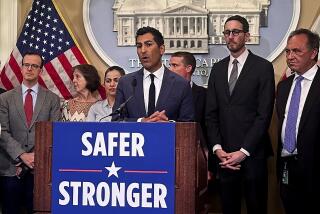‘Upskirting’ banned in Boston after governor signs bill
Guys who just days ago didn’t have to worry about jail time if they took a picture of what’s inside the skirt of a female passenger riding on a Boston trolley better think again after Massachusetts Gov. Deval Patrick on Friday signed a bill to prohibit “upskirting.”
The bill banning upskirting -- the sneaky practice of taking a picture of what is usually hidden by a dress or skirt -- quickly sailed through the Massachusetts Legislature on Thursday, a day after the state’s top court ruled that existing laws did not specifically prohibit the activity.
Patrick has signed the bill, his office said on Friday. He praised the Legislature for moving rapidly. “It shows they can do it when they want to,” Patrick told reporters as he walked into a cabinet meeting at the State House in Boston.
The Massachusetts Supreme Judicial Court stunned almost everyone by ruling in favor of a man who had been charged under the state’s Peeping Tom laws. The man had been accused of using a cellphone to take pictures of women on an MBTA trolley in 2010.
In its unanimous ruling, the court said prosecutors did not prove that the man had violated the state’s voyeurism law. Prosecutors failed to prove the women were photographed while naked or partially nude and that the women had a reasonable expectation of privacy while riding on the trolley.
“A female passenger on a MBTA trolley who is wearing a skirt, dress, or the like covering these parts of her body is not a person who is ‘partially nude,’ no matter what is or is not underneath the skirt by way of underwear or other clothing,” the court said in its ruling.
State law “does not apply to photographing (or videotaping or electronically surveilling) persons who are fully clothed and, in particular, does not reach the type of upskirting that the defendant is charged with attempting to accomplish on the MBTA,” the court said.
Under the bill signed Friday, it will be a misdemeanor to take secret photos and videos of “the sexual or other intimate parts of a person under or around the person’s clothing.” The law would apply to times when a “reasonable person” would believe those parts of their body would not be publicly visible.
Distributing those images could lead to felony charges under the law.
Follow LATimes National on Facebook
ALSO:
Principal charged with arson at North Dakota Catholic high school
Gambler who lost $500,000 sues, saying casino let him play drunk
Nuclear plant safety improves despite lapses, watchdog group says
More to Read
Sign up for Essential California
The most important California stories and recommendations in your inbox every morning.
You may occasionally receive promotional content from the Los Angeles Times.











